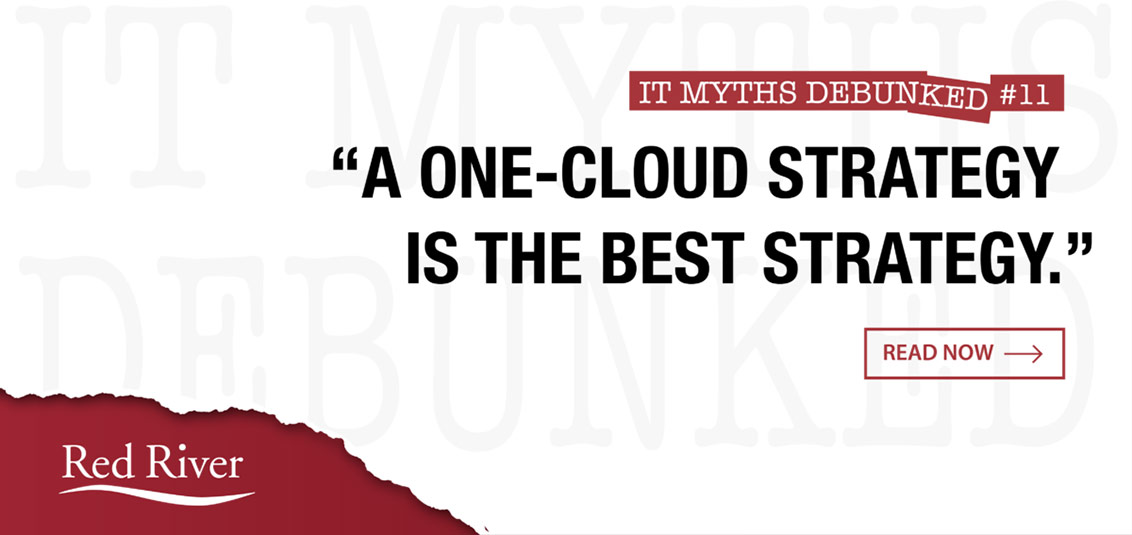
Is Single Cloud Better than a Multi-Cloud Strategy?
For many years, one of the most pervasive cloud myths has been that a single cloud solution is inherently better than a multi-cloud strategy. As with many cloud computing myths, this often comes from exposure to incorrectly configured, poorly designed systems.
According to Forbes, the typical enterprise now uses six cloud computing services. Not only is the multiple cloud strategy advantageous, but it’s quickly becoming standard and expected.
When it comes to single cloud vs. multiple cloud infrastructure, the determining factor is really how well the system has been designed. There are many advantages of hybrid and multi cloud architecture, which we will discuss below.
The Myth of the Single Cloud vs. Multiple Cloud Strategy
First: Why are there still proponents of a single cloud strategy? In a perfect world, a single cloud solution is better secured and easier to orchestrate. With a single cloud, companies only have a single system to worry about. Ideally, that makes it easier to administrate.
Additionally, many companies with multiple clouds have grown organically and have added multiple clouds to their existing infrastructure in a haphazard fashion; this can lead people to believe that a multiple cloud strategy is chaotic and difficult to maintain. In essence, when people say that a single cloud is inherently better than a multiple cloud strategy, they are comparing the best-case scenario of a single cloud with the worst-case scenario of a multiple cloud framework.
Let’s take a look at some advantages of a multiple cloud solution that can frequently be ignored.
Working with the Best Solutions on the Cloud
Most companies aren’t “the best” at everything. With a single cloud solution, you may end up with a great core platform that has some lackluster add-ons. Comparatively, with a multi-cloud solution, you’re able to select from the best of the best; you are able to get the solutions that are best for your organization without compromise. On an industry level, the ability to pick and choose from cloud solutions also enforces competition. While there are few all-in-one solutions out there, there are hundreds if not thousands of solutions for every common cloud problem.
Ensuring the Best Pricing for Cloud Solutions
When you rely upon a single system, you are a captive audience; costs can rise. To some extent, it’s a convenience charge: You’re being charged for the convenience of getting everything you need all out of a single box. But with multi-cloud solutions, you’re able to more freely negotiate with each vendor. You may even find that some of your platforms are best served through the use of open-source utilities that cost nothing at all, without having to sacrifice the other commercial services that you have invested in.
Being Able to Operate with More Flexibility
If you have a single cloud solution and you need additional features, you may need to transition to another solution altogether. But with a multi-cloud solution, you have the freedom to change your system on a modular level. You won’t find yourself stuck with a system that doesn’t work for you, nor will you find yourself unable to find support for a new feature that you need. Multi-cloud solutions vastly improve the flexibility of your system, reducing the risk that you could find yourself boxed in by your product.
Improving the Security of Your Infrastructure
By segregating your infrastructure properly through multiple clouds, you actually reduce your attack surface and improve the integrity of your operations. If a single solution is breached, it won’t give access to the data held within all the other solutions. When there are more solutions to breach, there’s less data held on each independent solution. And if security is being handled correctly, this will ensure that no breach becomes a system-wide breach. Security alone can make the question of single cloud vs. multi-cloud come out on the side of multiple solutions.
Reducing Reliance on Any Single Vendor
If you have a single cloud solution and your system goes down, your entire system is down. Comparatively, if you have multiple solutions, you may still be able to perform some system critical tasks even if one of your important modules isn’t accessible. Having a multiple cloud solution actually increases your reliability and your performance, because you’re able to continue business operations even if some systems are unavailable (and any system can fail).
The truth is that there are many advantages of hybrid cloud strategies—the issue is often in implementation. A hybrid cloud solution is inherently more complex, especially if it’s a hybrid multi cloud infrastructure that includes both remote and on-premises platforms. When designed correctly, multiple cloud strategies are incredibly powerful—but they have to be designed correctly.
Are you interested in learning more about the benefits of a multiple cloud strategy? It’s not right for every organization, but it might be right for yours. Contact Red River today for an assessment.

written by
Corrin Jones
Corrin Jones is the Director of Digital Demand Generation. With over ten years of experience, she specializes in creating content and executing campaigns to drive growth and revenue. Connect with Corrin on LinkedIn.




